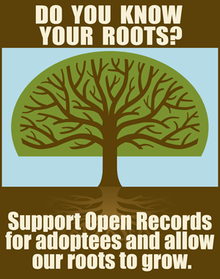Access to US Adoption Records

Adoption is the method of a birth parent, or birth parents of a child or children, signing over all rights and responsibilities to another person or couple, making this new person, or people, the legal guardian(s) of said child or children. One out of every 25 U.S. families with children have an adopted child.[1] There has always been a controversy over whether or not one should be allowed to access their adoption records.
Health risks
One reason an adoptee should have access to his or her adoption record is to obtain information found their medical history.
A complete family medical history consists of three generations of relatives.[2] Certain cancers, heart diseases, high blood pressure, strokes, and diabetes are all common disorders that have a high chance of being developed by a family member. Knowing one’s family history, allows medical professionals to better determine any risks that may be at stake. Although, a person may have relatives with medical conditions and not develop any of them. Only knowing the family history can reduce that person’s risk. Talking to relatives about their medical history is commonly known as the easiest way to find this information.[2] But, many adoptees don’t have this privilege. Access to adoption records can improve the healthcare one receives.
The original purpose of a sealed adoption is to protect the best interests of the adoptee.[3] It also allows the adoptee and adoptive parents to have an intimate relationship that is not interfered. Although, that child does grow up and and often develops the need to “find themselves.” Adoptees often have a lot of curiosity when it comes to birth families. This can be psychologically damaging because of the feeling of emptiness and rootlessness.[3] Adoptees often take his needs and make a legal argument out of them. Every case is different and every decision made is different. Judges try to consider the interests of all parties involved and the strength of the adoptee’s need to know the information.[3]
An important piece of evidence that is important to many adoptees is their original birth certificate. This gives them simple information such as the date of birth, gender, place of birth, weight, length, time, amount of children birthed, hospital, and attending physician.[4] The birth parents should be given on the birth certificate. An amended birth certificate is usually created when an adoption has been made. This usually replaces the names of the birth parents with the adoptive parents. If the name of the child has been changed, this change would also appear on this new document. The original is usually placed with other adoption records and is sealed by the court. The original is generally not ever available to the adoptee.[4]
Stories
Maureen Sheridan is 38 year old woman living in New York City. She was adopted in 1976 and has has her birth certificate locked up and she is not entitled to see it. She had a precancerous mole that had to be removed and her doctor requested to look at her medical history. Unfortunately this information was not available to Maureen. Both of her two sons have had medical scares, which compels her to know more about her medical history. Ms. Sheridan hopes to find her biological mother in ambition to answer medical records for not only herself, but also her two sons.[5]
David Rosenberg passed away shortly after meeting his mother, Margaret Erle Katz. David died from thyroid cancer. Little did he know, until it was too late, that the disease ran in his family's genes. This information could have been the missing puzzle piece that could have prevented David from losing his life. The state would not allow David to access his records. His mother, on the other hand, has been updating that file with valuable medical information as well as contact information. She was promised that the information would be given to David's adoptive parents. But, they were never relayed over because of New York State's laws against adoptee's access to their own records.[6]
References
- ↑ "Surprising Facts You May Not Know About Adoption".
- 1 2 Reference, Genetics Home. "Why is it important to know my family medical history?". Genetics Home Reference. Retrieved 2016-10-12.
- 1 2 3 Arndt, M. (1986). Severed Roots: The Sealed Adoption Records Controversy. Northern Illinois University Law Review 6(1), 103-128.
- 1 2 "Birth Certificates for Adoptees". Adoption.com. Retrieved 2016-10-12.
- ↑ "New York Adoptees Fight for Access to Birth Certificates".
- ↑ "A Son Given Up for Adoption Is Found After Half a Century, and Then Lost Again".